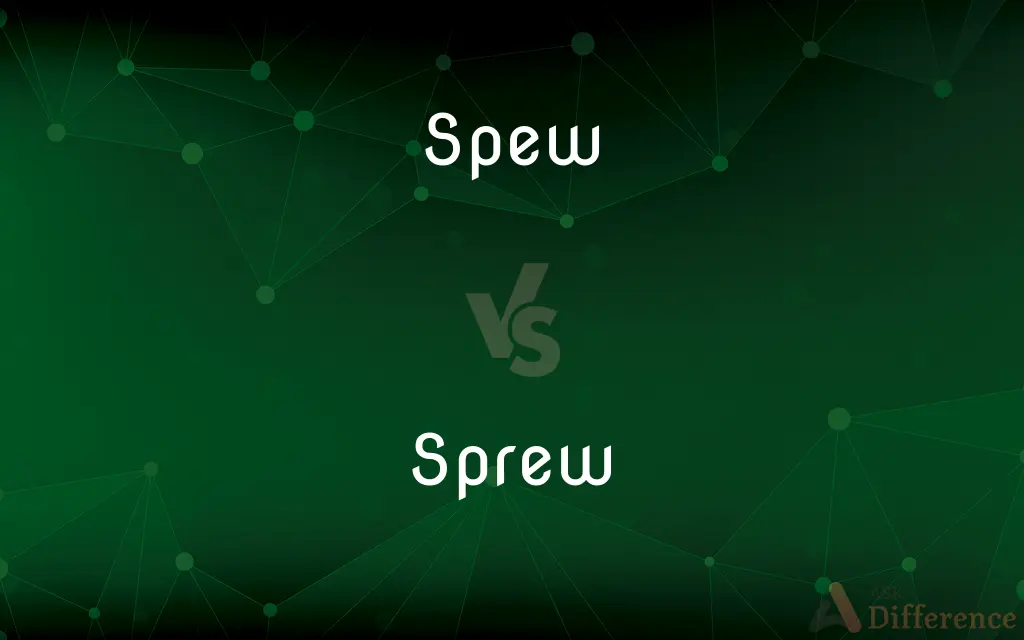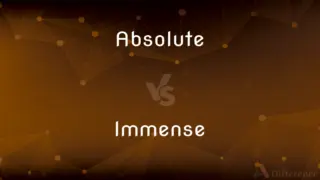Spew vs. Sprew — What's the Difference?
By Fiza Rafique & Maham Liaqat — Updated on March 30, 2024
Spew refers to the act of expelling a large amount of something, often violently, whereas sprew is not a recognized term in standard English.

Difference Between Spew and Sprew
Table of Contents
ADVERTISEMENT
Key Differences
Spew is used to describe the act of expelling substances, often in a forceful or violent manner, such as lava from a volcano or words in anger. On the other hand, sprew appears to be a typographical error or a non-standard variant, as it is not recognized in formal English usage.
While spew can be applied in both physical and metaphorical contexts (e.g., spewing lava or spewing insults), the term sprew, if encountered, might often be the result of a misspelling or confusion with another word. Correct understanding and communication typically require the use of established terms like spew.
In literature and speech, spew is commonly used to convey a sense of violence or intensity in the expulsion of substances or words. The non-existence of "sprew" in recognized English dictionaries highlights the importance of context and correct spelling in effective communication.
Due to the lack of recognition and definition for sprew, discussions and comparisons are inherently limited to spew and its applications. This underlines the importance of accuracy in language and the challenges posed by non-standard or incorrect terms.
The use of spew, especially in descriptive writing or storytelling, can evoke vivid imagery or strong emotional responses, emphasizing the power of language to convey intensity and action. The absence of a standard definition or usage for sprew means that it does not contribute to English language discourse in a meaningful way.
ADVERTISEMENT
Comparison Chart
Definition
To expel a large amount of substance, often violently.
Not a recognized term in standard English.
Context of Use
Both physical and metaphorical expulsions.
Undefined due to lack of recognition.
Example Usage
"The volcano began to spew lava."
N/A
Emotional Connotation
Often negative, associated with violence or intensity.
N/A
Recognition in English
Widely recognized and used.
Lacks recognition and standard usage.
Compare with Definitions
Spew
Can have a metaphorical use, implying verbal outburst.
He began to spew insults during the argument.
Sprew
Can denote a precise application.
The artist sprayed paint onto the canvas.
Spew
Indicates a rapid, sometimes uncontrollable, discharge.
The broken pipe began to spew water across the kitchen floor.
Sprew
Associated with devices designed for dispersion.
The firefighter used a hose to spray water on the fire.
Spew
Often associated with expulsion of unwanted substances.
The trash bin spewed an unpleasant odor.
Sprew
Often involves a controlled action.
He sprayed cologne before leaving the house.
Spew
To eject forcefully; often used for lava or vomit.
The volcano began to spew ash and lava.
Sprew
To disperse liquid in fine droplets.
She used a bottle to spray the plants.
Spew
Used across various contexts, from natural phenomena to mechanical failures.
The old engine spewed smoke as it started.
Sprew
Utilized for coverage or distribution.
The farmer sprayed fertilizer across the field.
Spew
To send out or force out in large amounts
A volcano that spewed molten lava.
Spewed invective at his opponent.
Sprew
Thrush
Spew
To vomit or otherwise cast out (matter) through the mouth.
Sprew
Thrush.
Spew
To flow or gush forth
Water was spewing from the hydrant.
Spew
To vomit.
Spew
Something spewed.
Spew
(transitive) To eject forcibly and in a stream,
Spew
(intransitive) To be forcibly ejected.
Spew
(transitive) To speak or write quickly and voluminously, especially words that are not worth listening to or reading.
Spew
(intransitive) To be written or spoken voluminously.
Spew
To vomit.
Spew
(intransitive) To ejaculate.
Spew
To develop a white powder or dark crystals on the surface of finished leather, as a result from improper tanning.
Spew
(slang) Vomit.
Spew
(slang) Ejaculate or ejaculation.
Spew
Nonsense or lies.
Spew
Material that has been ejected in a stream, or the act of spewing.
Spew
A white powder or dark crystals that appear on the surface of improperly tanned leather.
Spew
Adhesive that is squeezed from a joint under pressure and held across the joint by a fillet, thereby strengthening the joint.
Spew
To eject from the stomach; to vomit.
Spew
To cast forth with abhorrence or disgust; to eject.
Because thou art lukewarm, and neither hot nor cold, I will spew thee out of my mouth.
Spew
To vomit.
Spew
To eject seed, as wet land swollen with frost.
Spew
That which is vomited; vomit.
Spew
Expel or eject (saliva or phlegm or sputum) from the mouth;
The father of the victim spat at the alleged murderer
Spew
Eject or send out in large quantities, also metaphorical;
The volcano spews out molten rocks every day
The editors of the paper spew out hostile articles about the Presidential candidate
Spew
Eject the contents of the stomach through the mouth;
After drinking too much, the students vomited
He purged continuously
The patient regurgitated the food we gave him last night
Common Curiosities
Can spew be used positively?
While typically negative, "spew" can be used neutrally in contexts like spewing data or information, depending on tone.
Is spraying always deliberate?
Yes, spraying implies a controlled, deliberate action, unlike the often uncontrollable nature of spewing.
How do spew and spray relate to natural phenomena?
Spew is used for phenomena like volcanic eruptions, while spray might describe ocean mist or rain.
Is a spray always liquid?
Yes, spraying refers specifically to the dispersion of liquids in droplets or a fine mist.
Can one convert spewing into spraying?
In some contexts, like with devices, controlling the expulsion can turn a spew into a more controlled spray.
What distinguishes spew from spray?
Spew is about forcefully ejecting substances, while spray focuses on dispersing liquid in droplets, often with control.
Can both terms apply to machines?
Yes, machines can spew smoke or spray coolant, depending on their function and the context.
Are there devices that can both spew and spray?
Devices like nozzles can be adjusted to either spew substances forcefully or spray them in a controlled manner.
How do spew and spray differ in terms of outcome?
Spewing often results in a chaotic discharge, while spraying aims for a targeted, even distribution.
How do artists use the concept of spew and spray?
Artists might spew materials for a dramatic effect or use spray techniques for fine, detailed work.
Share Your Discovery

Previous Comparison
Absolute vs. Immense
Next Comparison
Bow vs. ProwAuthor Spotlight
Written by
Fiza RafiqueFiza Rafique is a skilled content writer at AskDifference.com, where she meticulously refines and enhances written pieces. Drawing from her vast editorial expertise, Fiza ensures clarity, accuracy, and precision in every article. Passionate about language, she continually seeks to elevate the quality of content for readers worldwide.
Co-written by
Maham Liaqat














































